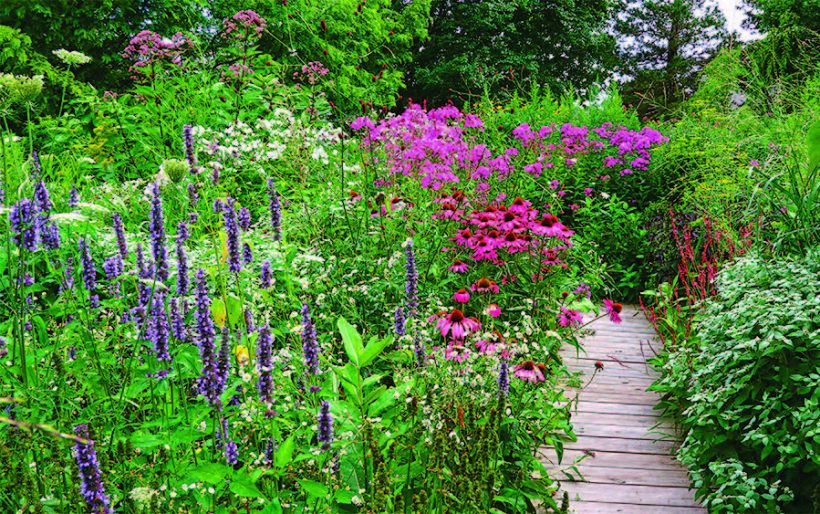By Tom Ringenberg
Every gardener, whether you grow vegetables, ornamentals, or fruit trees, knows how important, bees and other insect pollinators are to your garden. Unfortunately, you may have noticed in recent years that you are seeing fewer honeybees then you used to, not to mention there are all the media reports saying that there is a shortage of honeybees. I have enjoyed beekeeping off and on since I first took it first as a 4-H project as a teenager. While, keeping bees is a great way to help with the pollination process, not everyone is able to keep honeybees. Fortunately, there is still plenty that we can all do to help, not only honeybees, but native pollinators as well.
First, leave the dandelions alone. Yes, I am talking about those yellow flowers that pop up in everyone’s yard every spring that people spend loads of money on herbicides to eliminate them. However, dandelions are very important to bees and other pollinating insects emerging in the spring in that they are often the first food source available to them. Still, if you insist on having that “perfect” green lawn then perhaps at least wait until later in the spring to give plenty of other pollen and nectar producing plants a chance to become available.
Plant a wide variety of not only different types of plants, but different colors. Different pollinators prefer different colors of flowers, so it stands to reason that planting a wide variety of colored flowers will attract more of a variety of different pollinators. Also, plant plants that bloom at different times of year that way that regardless of what time during the growing season it is there will always be readily available sources of pollen and nectar available.
You might consider putting out some mason bee boxes. When most people think of insect pollinators the honeybee immediately comes to mind. While honeybees are important pollinators they are not native bees to North America. Instead they were introduced from Europe. Mason bees are native and are therefore much better adapted to pollinate our native plants more efficiently. While, honeybees are social bees living in colonies of thousands of bees, mason bees are solitary bees. Honeybees are easy to agitate and will readily sting requiring the use of protective clothing and gear whereas male mason bees have no stinger and while the queens do have stingers they rarely use them. Honeybees also need to be kept in specially made hives with removable frames of wax foundation, where the store Honey, pollen, and raise their young. A mason bee house on the other hand is very easy to construct using a scrape piece of untreated wood. Simply use a 5/16” drill bit and drill several holes between 3 to 5 inches deep without drilling through the other side and then placing them on the south side of a building, fence or tree.
Organic is best, but if you must use pesticides, then use them as sparingly as possible, apply them in the evening when most pollinators are not foraging, and avoid using neonicotinoids. Neonicotinoids, or neonic as they are sometimes called are a group of chemical pesticides that are closely related to nicotine. These chemicals attack the nervous system of the insect and resent research suggests that they are at least partially responsible for what has come to be known as honeybee colony collapse disorder. This family of chemicals includes acetamiprid, clothianidin, imidacloprid, nitenpyram, nitramine, thiacloprid, and thiamethoxam. While these chemicals are sold under several different trade names, you need only to look at the label for the active ingredients. These chemicals can be applied using several different methods including soaking seeds before planting. They are then absorbed into the plant tissue making the nectar and pollen, as well as other parts of the plant toxic to insects, including pollinators. Fortunately, many retailers are not waiting for the government to act and have agreed to quit selling products containing these chemicals or plants that have been treated with them, but it is still wise to check the labels or ask to be sure.
Finally, if you are interested in keeping honeybees, you can find more information, by contacting a local beekeeper in your area, your county cooperative extension office, or even join a local beekeeping club. You can also go to www.aces.edu, the website for the Alabama Cooperative Extension Service, or any number of other websites. You will be able to get the information you need to get started in beekeeping.
Tom Ringenberg, an intern in the 2016 Master Gardener Class, lives in Prattville, AL. For more information on becoming a master gardener, visit www.capcitymga.org or email capcitymga@gmail.com.
 Part of the Alabama Cooperative Extension Service (ACES)
Part of the Alabama Cooperative Extension Service (ACES)
